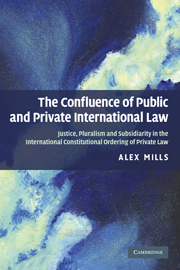 The Confluence of Public and Private International Law
The Confluence of Public and Private International Law Book contents
- Frontmatter
- Contents
- Acknowledgments
- Index of cases, judicial opinions and arbitral awards
- Abbreviations
- 1 Justice, pluralism and the international perspective
- 2 The private history of international law
- 3 From positivism to constitutionalism
- 4 Private international law and constitutional law in federal systems
- 5 The confluence of public and private international law
- 6 Conclusions
- Bibliography
- Index
2 - The private history of international law
Published online by Cambridge University Press: 20 January 2010
- Frontmatter
- Contents
- Acknowledgments
- Index of cases, judicial opinions and arbitral awards
- Abbreviations
- 1 Justice, pluralism and the international perspective
- 2 The private history of international law
- 3 From positivism to constitutionalism
- 4 Private international law and constitutional law in federal systems
- 5 The confluence of public and private international law
- 6 Conclusions
- Bibliography
- Index
Summary
Introduction
This Chapter examines and challenges the foundational narratives of international law, looking at the ‘private’ history of the relationship between international norms and private international law. By exploring the intersecting histories of public and private international law, it discredits the myth that these are necessarily discrete, distinct disciplines, with independent, parallel trajectories.
A typical history of private international law is ‘intrinsic’, a history of the development of legal doctrine within the discipline. Theories or approaches are presented chronologically, in a series of ‘epochs’ or competing ‘paradigms’. The story of their succession is told as a historical fact, without significant attention to contextual factors, suggesting the discipline is propelled forwards by internal dynamics. These limitations are the consequences of choices which reflect a theory of what is important and relevant. The typical history of private international law thus chooses to tell us only the story of private international law as the discipline is conceived today – a genealogical history of private international law as a discrete, autonomous, national discipline.
The focus in this Chapter is on the history of the theory of private international law, as expressed through the most influential writers and theorists in international law. It is not a history of the rules or practice of private international law, but an exploration of the influence of different ideas of private international law as expressed by international legal theorists, including theorists not traditionally viewed as a part of the history of the discipline of private international law.
- Type
- Chapter
- Information
- The Confluence of Public and Private International LawJustice, Pluralism and Subsidiarity in the International Constitutional Ordering of Private Law, pp. 26 - 73Publisher: Cambridge University PressPrint publication year: 2009


